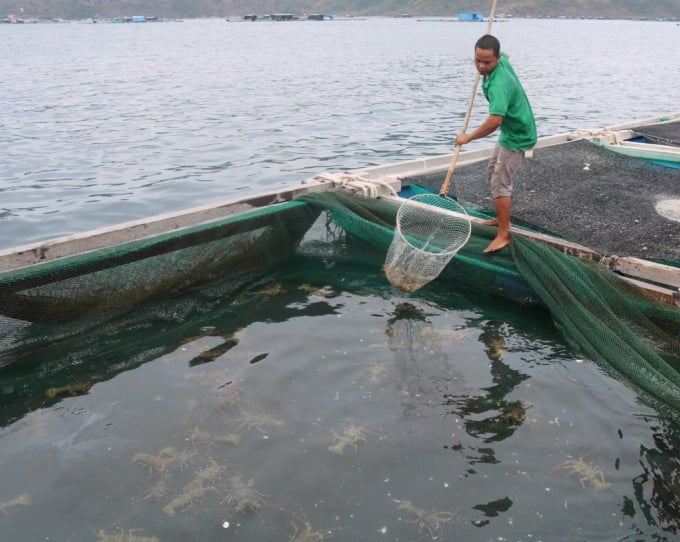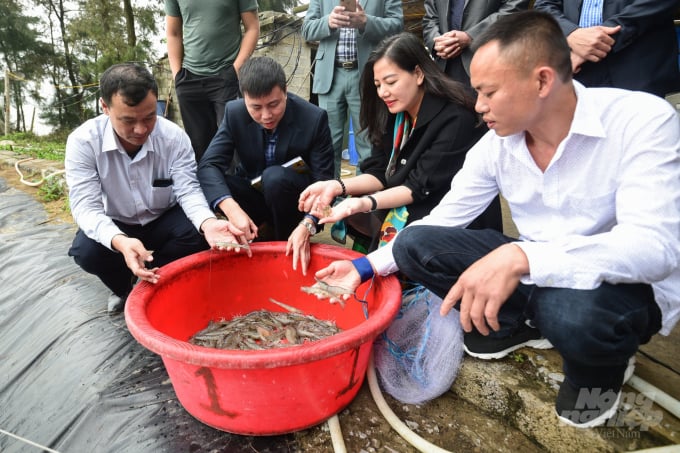November 28, 2025 | 00:46 GMT +7
November 28, 2025 | 00:46 GMT +7
Hotline: 0913.378.918
November 28, 2025 | 00:46 GMT +7
Hotline: 0913.378.918

Since the beginning of this year, the total damaged aquaculture area is over 8,300ha. Photo: NNVN.
In the official dispatch No. 3208/BN-TY sent to the People's Committees of the provinces and centrally-run cities on May 31 on strengthening measures to prevent and control aquatic diseases, the Ministry of Agriculture and Rural Development noted that the total damaged aquaculture area nationwide is over 8,300 hectares (including over 8,000 hectares of shrimp farming, over 250 hectares of pangasius farming and some other aquatic species), causing hundreds of billions of dollars in losses.
The statistics are based on the reports of localities since the beginning of this year.
Disease surveillance results reveal that many dangerous diseases continue to appear and have a high risk of spreading like white spot, acute hepatopancreatic necrosis, necrosis of hematopoietic and epithelial organs or hemorrhage.
However, more than 6,000ha of farmed shrimp were damaged but have not been sampled by local specialized agencies for testing and the cause has not been determined yet.
On the other hand, producing statistics and reporting epidemic data still contain many issues. Epidemiological investigation, active disease surveillance and environmental monitoring have not been implemented synchronously in order to warn, handle and prevent epidemics promptly and effectively, especially at the village, hamlet, commune and district level..
In order to overcome such issues and improve the effectiveness of the prevention of aquatic diseases, the Ministry of Agriculture and Rural Development has suggested the People's Committees of the provinces and centrally-run cities direct relevant departments, branches and People's Committees at all levels to organise the synchronous implementation of prevention and control solutions, base on the status of local aquaculture and the epidemic situation.
In particular, it is necessary to urgently implement the "National plan to prevent some dangerous diseases on farmed aquatic products, period 2021 - 2030" issued together with Decision No. 434/QD-TTg dated March 24 2021 of the Prime Minister; documents No. 2635/BNN-TY dated May 7, 2021 and No. 2772/TB-BNN-VP dated May 14, 2021 of the Ministry of Agriculture and Rural Development.
Local authorities need to review, adjust, supplement and provide funding to ensure effective implementation of the measures on prevention and control of aquatic diseases, including sampling, testing to determine the cause, investigating of mass and unusual aquatic deaths or diseases, actively monitoring diseases, coordinating with environmental monitoring to warn farming areas and implement appropriate epidemic prevention and control measures.

If any problems arise in the course of implementation, localities are requested to promptly send a report to the Ministry of Agriculture and Rural Development for handling coordination. Photo: NNVN.
Other measures include supplementing chemical sources, disinfecting, accelerating the construction of disease-free zones and facilities, supervising areas, establishments, aquatic production chains, and establishments producing aquatic breeds.
Local veterinary and fishery agencies should coordinate with the local authorities to actively monitor the progress of the epidemic situation, the phenomenon of mass and unusual aquatic deaths; produce statistics and reports; properly assess the actual situation and have specific solutions to improve the effectiveness of disease prevention and control; correct the statistics and reports on aquatic disease data, especially at the village, hamlet, commune and district levels.
Based on the situation of the Covid-19 pandemic, authorized groups should be organised to attend virtually meetings or directly visit key aquaculture areas, especially those affected or damaged by diseases or areas at high risk of disease outbreaks to inspect, urge and guide the implementation of measures to prevent and control diseases, as well as minimize damage to farmers.
Knowledge on prevention and control of aquatic diseases should be popularising among farmers, particularly on the quality of seed, water treatment, sampling, monitoring, testing for diseases in the rearing establishment, disinfecting and handling measures in case of epidemic outbreaks and constructing epidemic-free facilities.
If any problems arise in the course of implementation, localities are requested to promptly send a report to the Ministry of Agriculture and Rural Development for handling coordination.

(VAN) On November 27, in the meeting with Minister Tran Duc Thang, Mayor Yin Yong shared Beijing’s experience to improve environment and air quality.

(VAN) After 30 years, both sides identified strategic areas of cooperation: sustainable production, increasing coffee value and training for farmers.
/2025/11/27/4910-4-164708_294.jpg)
(VAN) On the afternoon of November 27 in Beijing, Minister of Agriculture and Environment Tran Duc Thang held a working session with several major Chinese enterprises operating in the agriculture and environment sector.

(VAN) The Department of Animal Health issued a provisional guideline requesting local authorities to increase surveillance, collect samples for testing, and conduct epidemiological investigations according to the established procedure.

(VAN) The United Nations recommends that Vietnam utilize data and artificial intelligence to enhance early disaster warnings and reduce GDP losses by 3.2% in the context of climate change.

(VAN) On the morning of November 27 in Beijing, Minister Tran Duc Thang and the Deputy Commissioner General of the General Administration of Customs of China signed a protocol on fresh jackfruit exports.

(VAN) As floodwaters recede, a vast network of irrigation works across eastern Gia Lai is emerging in a state of severe disrepair, with extensive damage demanding urgent restoration ahead of the 2025-2026 winter-spring cropping season.